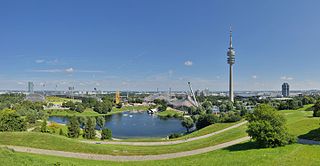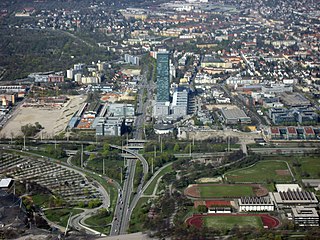
Kurt Georg Kiesinger was a German politician who served as Chancellor of Germany from 1 December 1966 to 21 October 1969. Before he became Chancellor he served as Minister President of Baden-Württemberg from 1958 to 1966 and as President of the Federal Council from 1962 to 1963. He was Chairman of the Christian Democratic Union from 1967 to 1971.
Ackermann is a surname. "Acker" comes from German or Old English, meaning "field", and is related to the word "acre", and therefore Ackermann means "fieldman". Notable people with the surname include:

Karl Lueger was an Austrian politician, mayor of Vienna, and leader and founder of the Austrian Christian Social Party. He is credited with the transformation of the city of Vienna into a modern city. The populist and antisemitic politics of his Christian Social Party are sometimes viewed as a model for Adolf Hitler's Nazism.

Christian Democratic and Flemish is a Christian democratic Flemish political party in Belgium. The party has historical ties to both trade unionism (ACV) and trade associations (UNIZO) and the Farmer's League. Until 2001, the party was named the Christian People's Party.
Christian democracy is a political ideology that emerged in nineteenth-century Europe under the influence of Catholic social teaching, as well as Neo-Calvinism. Christian democratic political ideology advocates for a commitment to social market principles and qualified interventionism. It was conceived as a combination of modern democratic ideas and traditional Christian values, incorporating the social teachings espoused by the Catholic, Lutheran, Reformed, and Pentecostal traditions in various parts of the world. After World War II, the Protestant and Catholic movements of the Social Gospel and Neo-Thomism, respectively, played a role in shaping Christian democracy. Christian democracy continues to be influential in Europe and Latin America, although it is also present in other parts of the world.
Catholic Church and politics aims to cover subjects of where the Catholic Church and politics share common ground.

Georg Leber was a German Trades Union leader and a politician in the Social Democratic Party of Germany (SPD).

The Olympiapark München in Munich, Germany, is an Olympic Park which was constructed for the 1972 Summer Olympics. Located in the Oberwiesenfeld neighborhood of Munich, the Park continues to serve as a venue for cultural, social, and religious events, such as events of worship. It includes a contemporary carillon. The Park is administered by Olympiapark München GmbH, a holding company fully owned by the state capital of Munich.
Brandes is a German surname and Jewish surname, and may refer to:

Hermann Höcherl was a German politician of the Christian Social Union in Bavaria (CSU). He served as Federal Ministry of the Interior from 1961 to 1965 and as Federal Minister for Food, Agriculture and Forests from 1965 to 1969

Westfriedhof is an U-Bahn station in Munich on the U1 line of the Munich U-Bahn system, it opened on 24 May 1998, the extension onwards to Georg-Brauchle-Ring was completed in 2003. 11 large lamps measuring 3.80 metres in diameter were installed in 2001 and bathe the station in blue, red and yellow light.
Georg Bachmann was a German politician. During his political career he represented the DNVP, CNBL and the Christian Social Union of Bavaria (CDU) during 1949 - 1954. From 1940 to 1945 he was a member of the Nazi Party. He was a member of the Landtag of Bavaria.
Georg Barfuß is a German politician, representative of the Christian Social Union of Bavaria.
Georg Ehnes is a German politician, representative of the Christian Social Union of Bavaria. He was a member of the Landtag of Bavaria.
Events from the year 1861 in Denmark.

Moosach[ˈmoːsax] is the 10th northwestern district of Munich, Bavaria, Germany. It is sectioned in the urban districts Hartmannshofen, Pressestadt and Borstei
The Lerchenauer Straße is a 5.5 km long arterial road in Munich.

Hanauer Straße in Munich is an arterial road about one and a half kilometers long extending from south to north in the Moosach district. It was named after the Hesse city of Hanau.












